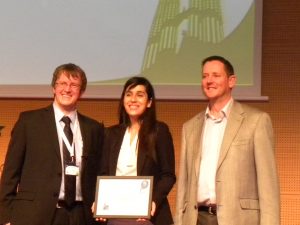NIA 2016 Where are they now? Maria Rambla-Alegra
 Maria Rambla-Alegre, Researcher at IRTA (Bruges, Belgium)
Maria Rambla-Alegre, Researcher at IRTA (Bruges, Belgium)
Maria Rambla-Alegre graduated in Chemical Sciences (specialization in Analytical Chemistry) at the University Jaume I (Castellon, Spain). Afterwards, she earned her PhD in Sciences also at this University, working on the determination of antibiotics using micellar liquid chromatography in physiological samples and food. Following her doctorate, she completed a one-year post Doctoral position at Ghent University (Ghent, Belgium); after which, she began working during three years as a research scientist at the Research Institute for Chromatography (RIC, Kortrijk, Belgium).
In July 2015 she has joined IRTA as a researcher, and will be in charge of the Analytical Chemistry Laboratory, aimed at the determination of marine biotoxins with different analytical techniques, mainly chromatographic, including mass spectrometry detection.
What are you current working on and what are your career highlights since winning the YIA?
Currently I have joined the Institute of Agro-food Research and Technology (IRTA) as a researcher in charge of the Analytical Chemistry Laboratory. My research focuses on the determination of marine biotoxins with different analytical techniques, mainly chromatographic, including mass spectrometry detection.
Following my doctorate, I have completed a one-year postdoctoral position at Ghent University (Belgium) in collaboration with Pfizer, one of the world’s premier biopharmaceutical companies; after which I worked for three years as a research scientist at the Research Institute for Chromatography (RIC;Kortrijk, Belgium). At RIC I was involved in the development and promotion of chromatographic and mass spectrometric knowledge and know-how. There I participated in a wide range of projects in a broad range of application areas, such as (bio)chemistry, biotechnology, petrochemistry, clinical chemistry, food, flavors and natural products, pharmaceutical sciences, toxicology, environmental chemistry and life sciences. In addition, I have published several articles in reputable scientific journals and presented communications in international symposia.
Bioanalysis is a very interesting field in controlling several forbidden substances in biological fluids, taking care of patient’s health and protecting consumers from adulterated food and food poisoning.
At IRTA, I am currently working on certain marine algae that produce potent toxins impactinghuman health through the consumption of contaminated shellfish and finfish, and through water and aerosol exposure. Bioanalytical methods are very useful when cases of poisoning are reported, including fatalities.
What did you hope to achieve when you entered for the award?
I was very surprised when I was awarded with the YIA, I did not expect it due to the high standard of candidates. This is a reputable award with excellent nominees from across the world; therefore I felt very fortunate and honoured to receive this award.
I hoped that this award reflected the effort i was putting in my research. When I entered the award, I wanted the award to recognizethe work of new and young investigators and encourage them to continue working in bioanalysis.
What was the impact of receiving the YIA?
Alongside a 1-year subscription to Bioanalysis, I received a US$1,000 prize from Waters Corporation and a travel fund to attend the European Bioanalysis Forum in Barcelona 2012 where i gave a presentation of my research. It was an honour to be invited to the Bioanalysis forum and discuss my work with researchers attending the forum in Barcelona. But this was just the beginning; this prestigious award recognizes a young researcher for his/her outstanding research in bioanalysis.
Receiving the YIAencouraged me to aspire to produce high quality research. It gave me the feeling that my work has a significant benefit to other people. It also offers invaluable networking experience and opportunities to meet with top researchers from the bioanalysis field.
What are your longer term plans?
Currently I have just started as a researcher at IRTA within the Marine Monitoring subprogram, which includes 15 scientists and technicians. Wwe conduct research on harmful algae, marine toxins, food safety and development of monitoring programs; focusing on microalgae taxonomy, population dynamics, method development for marine toxin quantification and risk assessment.
At IRTA I share my research interest on toxins and microalgae with duties from the official shellfish monitoring programme and from the quality system as technical responsible of the ISO 17025 IRTA’s accreditation. In addition, the combined research of scientists from different disciplines leads to the creation of new multidisciplinary projects and results in scientific advances.
With the present global economic crisis it is difficult to envisage the future and it is difficult when the budget of your country is cut out for the research and innovation, however I am still working hard so that I can continue my research in bioanalysis in my country or abroad.
At present, I wish to stay in the marine monitoring subprogram at IRTA and continue developing bioanalytical and food safety methods that can be useful for the community. However it is still difficult to say what the future holds, but it does not matter where I work as long as my work can contribute to improving the existing bioanalytical methods and assure quality in the results.
What advice would you offer to other scientists new to bioanalysis?
Bioanalysis plays aparamount role in different scientific and medical fields. In particular, drug discovery and development, point-of-care medical diagnosis, green chemistry and renewable energy all greatly benefit from bioanalytical devices and protocols.
The research in bioanalysis is increasingly conducted through collaborations os several different experts in the fields of biology, chemistry and biochemistry. As, more experts from different areas continue to work together, I believe that the field of bioanalysis will grow quickly and strongly over time.
In my research I often work on the development of green bioanalytical methods that do not pollute the environment. The use of organized media or the introduction of ionic liquids (considered green compounds) could help to achieve this goal and avoids the use of high amounts of organic solvents.
It must be highlighted that bioanalysis should work in the interest of all people and not only serve those who have power or money, and be available to all laboratories. Sometimes researchers have great ideas but cannot put them into practice owing to a lack of financial support. So, more focus, support and investment are needed from governments and research agencies in bioanalysis, because bioanalysis is a good way to contribute to building a better society.
Would you recommend entering the YIA?
Of course, it is a marvellous experience and a very reputable award by the international bioanalytical community. This award encourages young investigators to work harder with their research groups and contribute more to this growing field of bioanalysis.
Obviously winning an award can generate great amounts of publicity but just being a finalist or runner-up can give you good coverage. Going through the application process can provide you with the opportunity to take a close look at all your work in Bioanalysis. In addition, this award provides a great opportunity to talk to a wider audience about your research work and meet new researchers in your area and offers new connections for future work.
Entering the YIA award and winning gives confidence and pride in your work. Furthermore it makes your hard work throughtout the years all the more worthwhile, so I completely recommend it!




